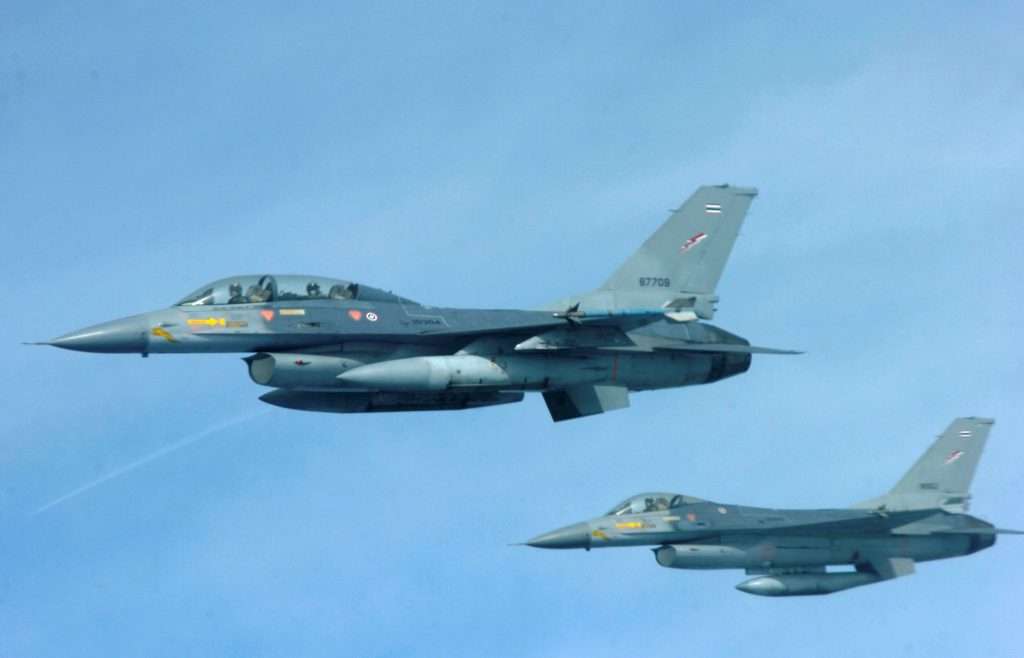Thailand-Cambodia armed border-clash sees Thai F-16s deployed

Two Royal Thai Air Force F-16 aircraft fly in formation March 17, 2009, as a part of the aerial missions of Exercise Cope Tiger in Korat, Thailand. Cope Tiger is an annual multi-lateral exercise meant to demonstrate joint and multinational capabilities and improve interoperability between the United States, Thailand and the Republic of Singapore. (U.S. Marine Corps photo by Cpl. Melani R. Stemmler/Released)
At least 11 civilians have been killed following armed border clashes that erupted between Thailand and Cambodia on July 24th as Cambodia fired rockets and artillery, according to The Straits Times on July 24th. Cambodian-fired weapons were followed by Thai-launched air strikes from F-16s at Cambodian military targets. This is a major escalation of an armed skirmish on May 28th which saw the death of one Cambodian soldier.
Thailand and Cambodia remain locked in a long-running border dispute over the Emerald Triangle, a trilateral border region where several ancient temples stand. Since the initial armed skirmish, both sides have implemented non-violent measures against each other, such as Thailand restricting border crossings and Cambodia restricting certain Thai imports. The International Court of Justice or ICJ, previously awarded the Preah Vihear temple to Cambodia back in 1962, which was affirmed in 2013 after clashes in 2008 and 2011. Cambodia has recently requested the ICJ to resolve four contested areas, including Angkorian ruins which have been the subject of these clashes and the trilateral border area where fighting occurred.
The current clash began on the morning of the 24th close to the ancient Ta Muen Thom temple, along the border between the provinces of Thailand’s Surin and Cambodia’s Oddar Manchey.
The Thai army said six armed Cambodian soldiers opened fire near a military station, while Cambodia condemned Thailand for causing the escalation. Cambodia’s Foreign Ministry said in a statement that it “condemns in the strongest possible terms this reckless and hostile act by Thailand” urging the other party to cease all hostilities.
The Thai army claimed that five members of a Thai military patrol were wounded by a landmine on July 23rd in the northeastern Ubon Ratchathani province. Thailand’s Ministry of Public Health stated that at least 11 civilians had been killed in these strikes by Cambodia.
A Cambodian defence ministry spokesperson declined to comment when asked about casualties on its side.
Cambodia fired rockets and artillery into Thailand, which responded by carrying out strikes on two Cambodian military targets, Thai officials said. A Cambodian shell hit a Thai house killing one civilian and wounding three, including a five-year-old.
These actions were denounced by Thailand, calling Cambodia “inhumane, brutal and war-hungry”, blaming it for targeting homes and civilian infrastructure.
Thailand’s embassy in the Cambodian capital Phnom Penh, advised most of its citizens to leave the country “as soon as possible”. Thailand also recalled its ambassador and expelled its Cambodian counterpart in protest after casualties from the landmine explosion.
Cambodia’s Prime Minister Hun Manet, the son and protégé of long-time leader Hun Sen, requested on July 24th a UN Security Council meeting to address what his foreign ministry called “unprovoked military aggression”.
Fresh from his country’s hosting of last week’s ASEAN foreign ministers’ summit, the Prime Minister of Malaysia, Anwar Ibrahim, called on both ASEAN members to “stand down”. As chair of the Association of Southeast Asian Nations, the Prime Minister has been in direct communication with both leaders of Cambodia and Thailand. He urged both to declare an “immediate ceasefire to prevent further hostilities and to create space for peaceful dialogue and diplomatic resolution,” in a statement on Facebook.
Thailand and Cambodia have both undergone domestic political changes as a result of this long-standing crisis. Hun Manet stated this month, due to these clashes, that Cambodia would start a military conscription in 2025, enforcing a long-dormant draft law. Meanwhile, Thailand’s Prime Minister Paetongtarn Shinawatra was suspended from office by the Constitutional Court after a leaked phone call with Hun Sen in which she allegedly criticised the military’s handling of the crisis.
The clashes also saw Thailand introduce its Ukrainian-made T-84 Oplot tanks alongside Thai M-60s and Cambodian Soviet-era equipment such as T-55s, as well as BM-21 Grad and RM-70 rocket systems.
The Straits Times, Maghrebi.org
Want to chase the pulse of North Africa?
Subscribe to receive our FREE weekly PDF magazine











